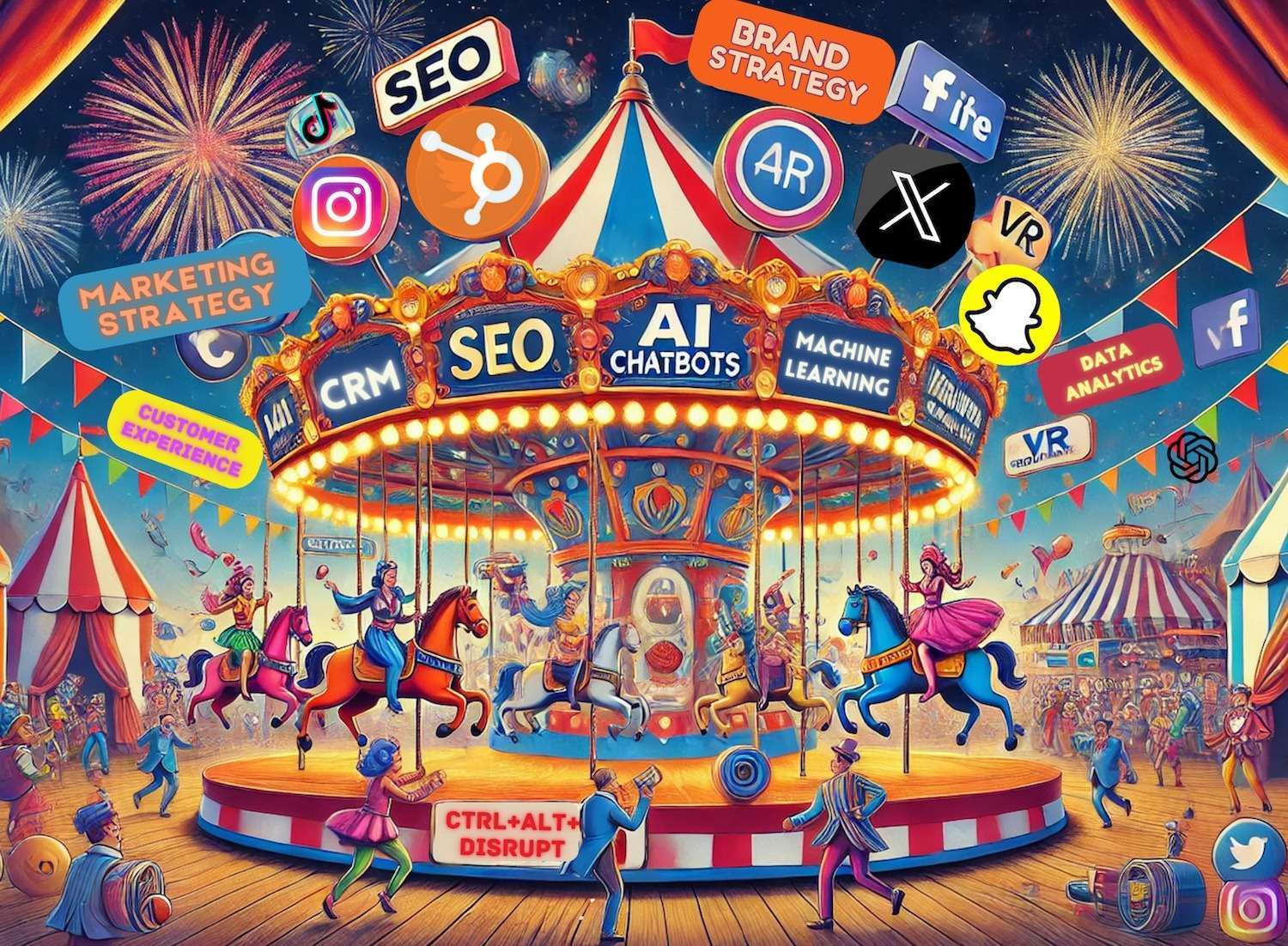How AI Transforms Real-Time Marketing: Ultimate Campaign Optimization
The Evolution of Real-Time Marketing Marketing campaigns once moved at the speed of human analysis, but artificial intelligence has fundamentally...
6 min read
Brands at Play : Feb 2, 2025 7:55:55 PM


The marketing landscape of 2025 demands a fundamental shift in how we approach brand strategy. Artificial intelligence (AI) is no longer a buzzword—it’s a powerful tool that is redefining the rules of engagement, personalization, and customer experience. Yet, many organizations still struggle to harness its true potential. In this post, we explore how AI is revolutionizing marketing strategy, supported by real statistics from industry leaders, and reveal the unprecedented opportunities awaiting brands that dare to embrace change.
AI has evolved consumer behavior analysis from an art of intuition to a precise, data-driven science. Modern AI tools offer unparalleled insights into consumer patterns, preferences, and future behaviors, allowing organizations to transform raw data into actionable intelligence. This evolution isn’t just about collecting information—it’s about leveraging it to drive strategic decision-making.
By harnessing AI-driven insights, organizations can now:

Today’s consumers demand seamless brand experiences across multiple touchpoints. AI enables true omnichannel integration by ensuring consistent, personalized interactions regardless of the platform. Key benefits include:
A recent report by Gartner predicts that by 2025, 75% of enterprise marketing organizations will integrate AI into their customer data management and experience programs (Gartner, 2021).

While AI provides the technological backbone for modern marketing, authentic brand storytelling remains paramount. Purpose-driven marketing thrives when it aligns genuinely with organizational values and resonates with the audience’s beliefs. AI helps uncover the subtle nuances in consumer sentiment, enabling brands to craft narratives that are both authentic and impactful.

Today’s consumers expect a level of personalization that was once unimaginable. AI is the engine behind this transformation, redefining personalization expectations and delivering experiences that are tailored to individual needs.
According to a study by Epsilon, 80% of consumers are more likely to make a purchase when brands offer personalized experiences (Epsilon, 2018).
As AI capabilities expand, ethical considerations are more critical than ever. Transparent use of AI and a commitment to protecting consumer privacy build trust and strengthen customer relationships. Responsible AI practices include:
According to a report by the World Economic Forum, ethical AI practices are essential to maintaining consumer trust, especially as data privacy concerns continue to rise (World Economic Forum, 2021).

In today’s fast-paced business environment, immediate response capabilities are no longer optional—they are essential. AI empowers brands to engage with consumers in real time, enhancing customer satisfaction and driving conversions.
IBM reports that AI-driven marketing can improve conversion rates by up to 50% through real-time engagement strategies (IBM, 2020).
To succeed in 2025 and beyond, organizations must build scalable, integrated marketing frameworks that evolve with technological advances and changing consumer expectations. Future-proofing your strategy involves:
Statista forecasts that the global AI software market will reach $126 billion by 2025, highlighting the urgency for organizations to adopt scalable AI solutions (Statista, 2020).
The future of marketing belongs to those who dare to innovate—balancing AI’s transformative power with human creativity and strategic thinking. CONTROL+ALT+DISRUPT provides a comprehensive framework for navigating this transformation, empowering brands to balance innovation with authenticity. It challenges you to rethink traditional strategies, adopt ethical AI practices, and harness data-driven insights to create meaningful consumer connections.
Are you ready to transform your marketing strategy for the AI era? The tools and insights are at your fingertips—success will depend on how boldly and thoughtfully you apply them.
Answer:
Control+Alt+Disrupt is a groundbreaking marketing manifesto designed for modern marketers ready to challenge the status quo. The book provides actionable insights and data-driven strategies to help brands harness the power of AI, omnichannel integration, and ethical personalization. Blending irreverent humor with robust research, it guides marketing professionals through innovative techniques to predict consumer trends, build authentic brand narratives, and optimize real-time engagement. If you're eager to disrupt traditional marketing and lead the digital revolution, this book is your essential blueprint.
Answer:
AI marketing refers to the use of artificial intelligence to analyze consumer data, predict trends, and personalize customer interactions. It is important because it enables brands to deliver highly targeted, relevant experiences at scale, thereby improving engagement, increasing conversions, and building stronger customer relationships. For example, 84% of marketers are already leveraging AI-powered insights to forecast trends and drive personalization (Salesforce, 2023).
Answer:
AI enhances omnichannel marketing by orchestrating consistent messaging and personalized content across multiple platforms. It ensures that campaigns are synchronized, adjusts the timing of communications in real time, and optimizes engagement based on user behavior. This approach creates a seamless customer experience, ensuring that interactions are relevant and timely regardless of the channel. A recent Gartner report predicts that by 2025, 75% of enterprise marketing organizations will integrate AI into their customer data management and experience programs.
Answer:
Yes, AI can support authentic brand storytelling by analyzing consumer sentiment and social media trends to identify the values and messages that resonate most with your audience. This data-driven approach allows marketers to craft narratives that are both authentic and compelling, ensuring that brand stories align with customer expectations and values.
Answer:
AI-driven personalization offers several benefits, including dynamic content customization, predictive recommendations, and the creation of personalized customer journeys. A study by Epsilon found that 80% of consumers are more likely to make a purchase when brands offer personalized experiences. This not only boosts conversion rates but also fosters customer loyalty and satisfaction.
Answer:
Brands can build trust by adopting ethical AI practices, which include transparent communication about data usage, robust privacy measures, and regular audits of AI systems to ensure fairness. By being upfront about how AI is used and safeguarding consumer data, companies can foster trust and maintain strong customer relationships. The World Economic Forum emphasizes the importance of ethical AI to maintain consumer confidence.
Answer:
Organizations can future-proof their marketing strategy by implementing adaptable AI systems, creating scalable content frameworks, developing integrated measurement approaches, and building hybrid teams with both technical and creative expertise. With the global AI software market expected to reach $126 billion by 2025 (Statista, 2020), it is crucial to invest in flexible, forward-thinking solutions that evolve with changing technology and consumer expectations.

The Evolution of Real-Time Marketing Marketing campaigns once moved at the speed of human analysis, but artificial intelligence has fundamentally...

Uncover the emerging trends and technologies shaping the future of marketing, with clear insights tailored for strategic visionaries.

What Is Data-Driven Marketing? Data-driven marketing involves leveraging insights from customer data, market research, and real-time analytics to...